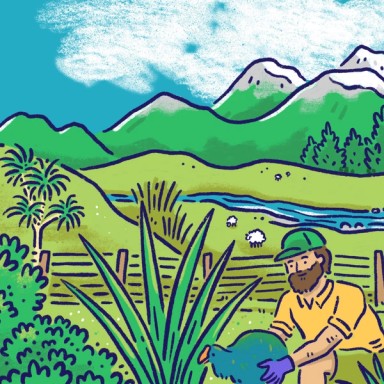
Party vote

Environment
Tackling climate change has been a priority of the current government since it was elected in 2017. But its climate policies have been met with resistance in some quarters, especially among farmers who say efforts to reduce emissions threaten the industry's bottom line. However, others say the government’s climate change measures don’t go far enough, as the devastating impacts of climate change become ever more visible.

Environment
Tackling climate change has been a priority of the current government since it was elected in 2017. But its climate policies have been met with resistance in some quarters, especially among farmers who say efforts to reduce emissions threaten the industry's bottom line. However, others say the government’s climate change measures don’t go far enough, as the devastating impacts of climate change become ever more visible.
Return conservation land to whānau, hapū and iwi
Increase diplomatic support for Pasifika leaders
Ban oil and gas exploration
Ban the use of synthetic nitrogen fertiliser by 2025
Fund Māori farmers to transition from emissions-intensive farming
Fund Māori owned community energy projects
Acknowledge Māori rights over fresh water
Ensure that water rights are allocated fairly
Ban seabed mining
Expand coverage of ban on mining in conservation land
Develop a national Māori strategy for renewable energy and clean technology
Maintain target of 100% renewable energy by 2030
Phase out industrial coal burning by 2030
Bring agricultural methane emissions into the emissions trading scheme
Establish climate change adaptation plans with whānau, hapū and iwi
Reduce the number of weeks parliament sits
Reverse water infrastructure reforms
Tie NZ's carbon price to that of our trading partners
Grant carbon credits for wood products that store carbon for at least 50 years
End subsidies for commercial forestry
Reduce waste sent to landfills through modern waste technology
Improve environmental reporting laws
Provide tax refund using emissions trading scheme revenue
Abolish the Clean Car Discount and Clean Car Standard
Abolish Significant Natural Areas
Abolish existing forestry programmes
Sell Landcorp and use proceeds to fund conservation on private land
Allow farmers to offset all on-farm sequestration from their emissions liability
Lessen regulations around emissions reducing technologies
Reform resource management laws to reduce restrictions on private property
Repeal the Zero Carbon Act
Abolish the Climate Change Commission
Fund conservation initiatives on private land
Introduce a market-based system for managing water pollution
Introduce a pricing system for water allocation
Abolish the Climate Change Chief Executives Board
End initiatives to improve industrial energy efficiency
Abolish the Climate Emergency Response Fund
Create additional funding options for local government to upgrade their water infrastruture
Create long-term water infrastructure improvement plans with local councils
Expand water supply exemption to include suppliers of fewer than 30 users
Reverse the ban on offshore oil and gas exploration
Encourage the use of carbon capture technology
Speed up approval for offshore wind projects
Remove Te Mana o te Wai from freshwater resource consenting
Continue renewable energy funding partnership with BlackRock
Help Fonterra cut coal use at dairy factories
Increase the Hauraki Gulf protection area
Develop credit system to encourage conservation on private land
Create a process for community-led rāhui
Continue to support Jobs for Nature projects
Continue to aim for 100% renewable energy
Support iwi and hapū-led solutions to protect sites affected by sea level rises
Consider a fund for Māori climate change researchers and scientists
Continue to fund research and development of technology that reduces agricultural emissions
Maintain plan to price agricultural emissions from 2025
Establish new research centres focused on tech, climate change, and pandemics
Provide tax rebates for improving energy efficiency in existing houses
Provide rebates for installing rooftop solar and battery storage
Increase funding for community renewable energy projects
Continue programme that installs solar panels on social housing
Develop a second emissions reduction plan
Establish a Minister for Just Transitions to oversee the transition to a low emissions economy
Invest $300 million in NZ Green Investment Finance to support emissions reduction
Prioritise climate change in research and development
Introduce mandatory reporting requirements for agricultural emissions
Reward on-farm emissions sequestration
Remove all remaining coal boilers in schools, tertiary institutions and hospitals
Remove diesel generators from all schools
Set separate targets for gross emissions reductions and carbon dioxide removals
Establish a centre to train renewable energy workers
Work with the private sector to expand electric vehicle charging network
Provide grants for low-emissions heavy vehicles for freight
Decarbonise the public transport network by 2035
Improve the delivery of walking and cycling infrastructure
Give the Climate Change Commission more independence
Limit the amount of exotic carbon afforestation caused by the emissions trading scheme
Electrify the main trunk line between Papakura and Te Rapa
Provide free public transport to under 30s
Provide a $1500 credit for bikes and e-scooters to under 30s
Replace all urban buses with electric buses by 2030
Require investor visa applicants to fund refugee resettlement
Provide incentives for farmers to adopt more sustainable land use practices
Exclude new forestry from the emissions trading scheme
Introduce a fixed cap on units in the emissions trading scheme
Empower the Climate Change Commission to set the carbon price
Use emissions trading scheme revenue for renewable energy and emissions free transport
Review planning systems to ensure they consider climate adapation
Provide extra height allowance for developments that meet sustainability and other standards
Establish a Ministry of Climate Change
Empower the Climate Change Commission to set unit supply in the Emissions Trading Scheme
Strengthen the Zero Carbon Act
Introduce a price on agricultural emissions
Expand the emissions trading scheme to include sequestration
Meet NZ's Paris Agreement commitments
Pass a Climate Change Adaptation Bill
Ensure climate adaptation planning affirms tino rangatiratanga
Prioritise long-term, nature-based solutions over short-term engineering solutions
Ensure planning frameworks give effect to the need for climate adaption
Fund climate adaption and resilience measures
Increase support for Pacific countries adapting to climate change
Reform the Reserves Act to incorporate te Tiriti o Waitangi
Ban new mining on conservation land
Aim to double natural wetlands by 2050
Provide financial incentives to protect and enhance indigenous biodiversity
Increase funding for predator, weed and pest control
Continue funding Jobs for Nature
Eradicate pests on the sub-Antarctic Maukahuka Auckland Islands
Implement global biodiversity targets
Use proceeds from the visitor levy for conservation and biodiversity projects
Ban new extraction of fossil fuels
Install solar panels on public buildings
Reform the electricity market to encourage renewable energy
Use dividends from energy companies to invest in clean energy
Prohibit new fossil fuel gas connections in most cases
Legislate for a right to a healthy environment
Ensure resource management or local government system changes uphold tino rangatiratanga
Improve environmental reporting laws
Increase funding for the Environmental Protection Authority
Create a national food strategy
Ban synthetic nitrogen fertilisers over time
Increase funding for indigenous forests
Reform the emissions trading scheme to reduce the use of forestry offsets
Ban products sourced from illegally logged forests
Provide grants and loans for home energy efficiency improvements
Expand programme that installs solar electricity in social housing
Implement Te Mana o te Wai for water management
Increase funding to protect natural wetlands
Allow rivers to follow their natural course
Set limits on nitrogen in waterways
Restore waterways and control freshwater pests
Implement a fair system for commercial water allocation
Focus defence spending on climate change, humanitarian aid and environmental monitoring
Promote climate change response initiatives through international institutions and trade
Work with unions, employers and Māori to transition to a low emissions economy
Prioritise the Māori economy in developing low-emissions jobs
Transform Rau Paenga into the Ministry of Green Works
Expand and strengthen protected marine areas
Establish an independent ocean commission
Restore the life-supporting capacity of oceans
Ban seabed mining
Ban set netting and dredging by 2028
Increase fishing restrictions in the Hauraki Gulf
Strengthen limits on fisheries bycatch
Require cameras on all commercial fishing vessels
Support Tagata Moana leadership on climate action
Assist Pacific Island states in marine protection initiatives
Support low-emissions industries
Facilitate the return of wrongfully alienated land to tangata whenua
Establish a Zero Waste Agency
Implement a right to repair for consumer products
Establish a beverage container return scheme
Introduce regulated stewardship schemes for certain products
Increase the landfill levy
Standardise labels for compostable and recyclable products
Set waste reduction targets for the building and construction sector
Encourage climate resilience in urban planning
Fund the restoration and protection of nature in urban areas
Expand energy efficiency scheme for low income households
Establish an ocean commission to provide advice and set targets for marine systems
Create a fund for developing mātauranga and tikanga-based ocean management tools
Establish an independent science advisory group for marine research
Expand marine protected areas to cover 30 percent of NZ's oceans
Ban bottom trawling in some marine areas and phase out set netting and dredging
Increase funding for marine biosecurity and review legislative framework
Develop the Dargaville Aerodrome
Stop the creation of new landfills
Create a fuel security plan
Oppose introducing emissions pricing for agriculture
Support standardised farm-level emissions reporting
Incentivise emissions reduction technology using funds intended for overseas carbon credits
Remove Te Mana o te Wai from freshwater resource consenting
Continue to support Farm Environment Plans
Require forestry harvesters to clean up slash
Recognise on-farm forestry in the Emissions Trading Scheme
Continue to support Jobs for Nature programme
Establish catchment boards to manage freshwater
Abolish the Clean Car Discount
Reform the planning rules for renewable energy generation
Issue a new national policy statement on renewable electricity generation
Introduce a national policy statement on hydrogen
Introduce a national policy statement on electricity distribution
Create a minister for hunting and fishing
Designate wapiti, sika and tahr as herds of special interest
Allow the Game Animal Council to make more decisions about game animal management
Recategorise game animals, trout and salmon
Establish national management plans for game animals
Guarantee managed access to public land for hunters and fishers
Create partnership agreements to maintain huts on conservation land
Oppose recreational licencing system for game animal hunting or sea fishing
Establish seats for hunters and fishers on conservation bodies
Review game animal management programmes
Reverse water infrastructure reforms
Require councils to produce a plan for water infrastructure
Expand the scope of the water quality regulator to include waste and storm water
Establish a water infrastructure regulator
Continue joint venture with businesses for reducing agricultural emissions
Introduce a pricing system for agricultural emissions by 2030
Review methane emissions targets
Make on-farm carbon sequestration eligible for units in the emissions trading scheme
Restrict the conversion of farmland to exotic forestry
Prohibit using foreign direct investment for converting farms to forestry
Narrow the scope of Significant Natural Areas
Amend rules for defining culverts and wetlands
Limit the scope of wetlands protections
Relax stock exclusion rules
Relax drinking water standards in some rural communities
Delay requirement for farmers to obtain resource consents for winter grazing
Replace winter grazing rules with catchment-level rules
Stop support for companies' emissions-reductions projects
Fund tax cut using emissions trading scheme revenue
Continue to fund green investment finance
Support more research on the construction sector
Encourage sustainable and environmentally friendly building standards
Increase funding for public electric vehicle charging infrastructure
Remove consenting requirements for electric vehicle charging infrastructure
Set minimum standards for electric vehicle chargers
Require electricity distribution companies to share information with electric vehicle charging providers
Upgrade Waiau-Toa/Molesworth trail into a Great Walk
Require DOC to make concession decisions for tourism businesses within one year
Remove most consent requirements for building water storage on farmland
Remove consent requirements for creating wetlands
Reverse the ban on offshore oil and gas exploration
Consider making wood processing eligible for emissions trading scheme credits
Plant trees on public land with low conservation or farming value
End all climate taxes, subsidies and regulations
Maintain restrictions on genetic modification
Increase funding for climate resilience measures
Return conservation land to whānau, hapū and iwi
Increase diplomatic support for Pasifika leaders
Ban oil and gas exploration
Ban the use of synthetic nitrogen fertiliser by 2025
Fund Māori farmers to transition from emissions-intensive farming
Fund Māori owned community energy projects
Acknowledge Māori rights over fresh water
Ensure that water rights are allocated fairly
Ban seabed mining
Expand coverage of ban on mining in conservation land
Develop a national Māori strategy for renewable energy and clean technology
Maintain target of 100% renewable energy by 2030
Phase out industrial coal burning by 2030
Bring agricultural methane emissions into the emissions trading scheme
Establish climate change adaptation plans with whānau, hapū and iwi
Reduce the number of weeks parliament sits
Reverse water infrastructure reforms
Tie NZ's carbon price to that of our trading partners
Grant carbon credits for wood products that store carbon for at least 50 years
End subsidies for commercial forestry
Reduce waste sent to landfills through modern waste technology
Improve environmental reporting laws
Provide tax refund using emissions trading scheme revenue
Abolish the Clean Car Discount and Clean Car Standard
Abolish Significant Natural Areas
Abolish existing forestry programmes
Sell Landcorp and use proceeds to fund conservation on private land
Allow farmers to offset all on-farm sequestration from their emissions liability
Lessen regulations around emissions reducing technologies
Reform resource management laws to reduce restrictions on private property
Repeal the Zero Carbon Act
Abolish the Climate Change Commission
Fund conservation initiatives on private land
Introduce a market-based system for managing water pollution
Introduce a pricing system for water allocation
Abolish the Climate Change Chief Executives Board
End initiatives to improve industrial energy efficiency
Abolish the Climate Emergency Response Fund
Create additional funding options for local government to upgrade their water infrastruture
Create long-term water infrastructure improvement plans with local councils
Expand water supply exemption to include suppliers of fewer than 30 users
Reverse the ban on offshore oil and gas exploration
Encourage the use of carbon capture technology
Speed up approval for offshore wind projects
Remove Te Mana o te Wai from freshwater resource consenting
Continue renewable energy funding partnership with BlackRock
Help Fonterra cut coal use at dairy factories
Increase the Hauraki Gulf protection area
Develop credit system to encourage conservation on private land
Create a process for community-led rāhui
Continue to support Jobs for Nature projects
Continue to aim for 100% renewable energy
Support iwi and hapū-led solutions to protect sites affected by sea level rises
Consider a fund for Māori climate change researchers and scientists
Continue to fund research and development of technology that reduces agricultural emissions
Maintain plan to price agricultural emissions from 2025
Establish new research centres focused on tech, climate change, and pandemics
Provide tax rebates for improving energy efficiency in existing houses
Provide rebates for installing rooftop solar and battery storage
Increase funding for community renewable energy projects
Continue programme that installs solar panels on social housing
Develop a second emissions reduction plan
Establish a Minister for Just Transitions to oversee the transition to a low emissions economy
Invest $300 million in NZ Green Investment Finance to support emissions reduction
Prioritise climate change in research and development
Introduce mandatory reporting requirements for agricultural emissions
Reward on-farm emissions sequestration
Remove all remaining coal boilers in schools, tertiary institutions and hospitals
Remove diesel generators from all schools
Set separate targets for gross emissions reductions and carbon dioxide removals
Establish a centre to train renewable energy workers
Work with the private sector to expand electric vehicle charging network
Provide grants for low-emissions heavy vehicles for freight
Decarbonise the public transport network by 2035
Improve the delivery of walking and cycling infrastructure
Give the Climate Change Commission more independence
Limit the amount of exotic carbon afforestation caused by the emissions trading scheme
Electrify the main trunk line between Papakura and Te Rapa
Provide free public transport to under 30s
Provide a $1500 credit for bikes and e-scooters to under 30s
Replace all urban buses with electric buses by 2030
Require investor visa applicants to fund refugee resettlement
Provide incentives for farmers to adopt more sustainable land use practices
Exclude new forestry from the emissions trading scheme
Introduce a fixed cap on units in the emissions trading scheme
Empower the Climate Change Commission to set the carbon price
Use emissions trading scheme revenue for renewable energy and emissions free transport
Review planning systems to ensure they consider climate adapation
Provide extra height allowance for developments that meet sustainability and other standards
Establish a Ministry of Climate Change
Empower the Climate Change Commission to set unit supply in the Emissions Trading Scheme
Strengthen the Zero Carbon Act
Introduce a price on agricultural emissions
Expand the emissions trading scheme to include sequestration
Meet NZ's Paris Agreement commitments
Pass a Climate Change Adaptation Bill
Ensure climate adaptation planning affirms tino rangatiratanga
Prioritise long-term, nature-based solutions over short-term engineering solutions
Ensure planning frameworks give effect to the need for climate adaption
Fund climate adaption and resilience measures
Increase support for Pacific countries adapting to climate change
Reform the Reserves Act to incorporate te Tiriti o Waitangi
Ban new mining on conservation land
Aim to double natural wetlands by 2050
Provide financial incentives to protect and enhance indigenous biodiversity
Increase funding for predator, weed and pest control
Continue funding Jobs for Nature
Eradicate pests on the sub-Antarctic Maukahuka Auckland Islands
Implement global biodiversity targets
Use proceeds from the visitor levy for conservation and biodiversity projects
Ban new extraction of fossil fuels
Install solar panels on public buildings
Reform the electricity market to encourage renewable energy
Use dividends from energy companies to invest in clean energy
Prohibit new fossil fuel gas connections in most cases
Legislate for a right to a healthy environment
Ensure resource management or local government system changes uphold tino rangatiratanga
Improve environmental reporting laws
Increase funding for the Environmental Protection Authority
Create a national food strategy
Ban synthetic nitrogen fertilisers over time
Increase funding for indigenous forests
Reform the emissions trading scheme to reduce the use of forestry offsets
Ban products sourced from illegally logged forests
Provide grants and loans for home energy efficiency improvements
Expand programme that installs solar electricity in social housing
Implement Te Mana o te Wai for water management
Increase funding to protect natural wetlands
Allow rivers to follow their natural course
Set limits on nitrogen in waterways
Restore waterways and control freshwater pests
Implement a fair system for commercial water allocation
Focus defence spending on climate change, humanitarian aid and environmental monitoring
Promote climate change response initiatives through international institutions and trade
Work with unions, employers and Māori to transition to a low emissions economy
Prioritise the Māori economy in developing low-emissions jobs
Transform Rau Paenga into the Ministry of Green Works
Expand and strengthen protected marine areas
Establish an independent ocean commission
Restore the life-supporting capacity of oceans
Ban seabed mining
Ban set netting and dredging by 2028
Increase fishing restrictions in the Hauraki Gulf
Strengthen limits on fisheries bycatch
Require cameras on all commercial fishing vessels
Support Tagata Moana leadership on climate action
Assist Pacific Island states in marine protection initiatives
Support low-emissions industries
Facilitate the return of wrongfully alienated land to tangata whenua
Establish a Zero Waste Agency
Implement a right to repair for consumer products
Establish a beverage container return scheme
Introduce regulated stewardship schemes for certain products
Increase the landfill levy
Standardise labels for compostable and recyclable products
Set waste reduction targets for the building and construction sector
Encourage climate resilience in urban planning
Fund the restoration and protection of nature in urban areas
Expand energy efficiency scheme for low income households
Establish an ocean commission to provide advice and set targets for marine systems
Create a fund for developing mātauranga and tikanga-based ocean management tools
Establish an independent science advisory group for marine research
Expand marine protected areas to cover 30 percent of NZ's oceans
Ban bottom trawling in some marine areas and phase out set netting and dredging
Increase funding for marine biosecurity and review legislative framework
Develop the Dargaville Aerodrome
Stop the creation of new landfills
Create a fuel security plan
Oppose introducing emissions pricing for agriculture
Support standardised farm-level emissions reporting
Incentivise emissions reduction technology using funds intended for overseas carbon credits
Remove Te Mana o te Wai from freshwater resource consenting
Continue to support Farm Environment Plans
Require forestry harvesters to clean up slash
Recognise on-farm forestry in the Emissions Trading Scheme
Continue to support Jobs for Nature programme
Establish catchment boards to manage freshwater
Abolish the Clean Car Discount
Reform the planning rules for renewable energy generation
Issue a new national policy statement on renewable electricity generation
Introduce a national policy statement on hydrogen
Introduce a national policy statement on electricity distribution
Create a minister for hunting and fishing
Designate wapiti, sika and tahr as herds of special interest
Allow the Game Animal Council to make more decisions about game animal management
Recategorise game animals, trout and salmon
Establish national management plans for game animals
Guarantee managed access to public land for hunters and fishers
Create partnership agreements to maintain huts on conservation land
Oppose recreational licencing system for game animal hunting or sea fishing
Establish seats for hunters and fishers on conservation bodies
Review game animal management programmes
Reverse water infrastructure reforms
Require councils to produce a plan for water infrastructure
Expand the scope of the water quality regulator to include waste and storm water
Establish a water infrastructure regulator
Continue joint venture with businesses for reducing agricultural emissions
Introduce a pricing system for agricultural emissions by 2030
Review methane emissions targets
Make on-farm carbon sequestration eligible for units in the emissions trading scheme
Restrict the conversion of farmland to exotic forestry
Prohibit using foreign direct investment for converting farms to forestry
Narrow the scope of Significant Natural Areas
Amend rules for defining culverts and wetlands
Limit the scope of wetlands protections
Relax stock exclusion rules
Relax drinking water standards in some rural communities
Delay requirement for farmers to obtain resource consents for winter grazing
Replace winter grazing rules with catchment-level rules
Stop support for companies' emissions-reductions projects
Fund tax cut using emissions trading scheme revenue
Continue to fund green investment finance
Support more research on the construction sector
Encourage sustainable and environmentally friendly building standards
Increase funding for public electric vehicle charging infrastructure
Remove consenting requirements for electric vehicle charging infrastructure
Set minimum standards for electric vehicle chargers
Require electricity distribution companies to share information with electric vehicle charging providers
Upgrade Waiau-Toa/Molesworth trail into a Great Walk
Require DOC to make concession decisions for tourism businesses within one year
Remove most consent requirements for building water storage on farmland
Remove consent requirements for creating wetlands
Reverse the ban on offshore oil and gas exploration
Consider making wood processing eligible for emissions trading scheme credits
Plant trees on public land with low conservation or farming value
End all climate taxes, subsidies and regulations
Maintain restrictions on genetic modification
Increase funding for climate resilience measures
Policies
Compare the parties’ positions on the key issues this election
Candidates
See the electorate candidates running in your local area
Parties
Learn about each political party, its leaders and candidate list
Compare the candidates running in your local area
Each part of the country is represented in Parliament by an electorate MP. We've asked every candidate about their priorities for your community and why they deserve your vote.












